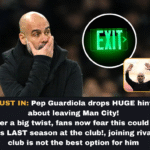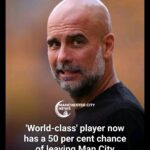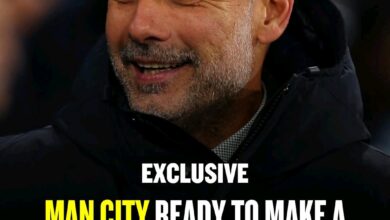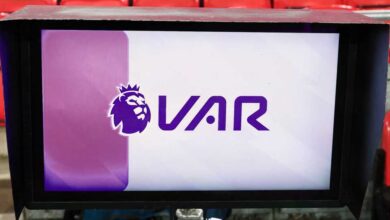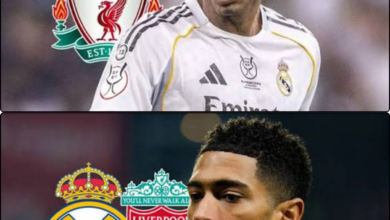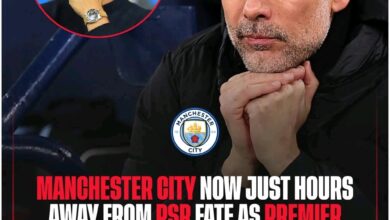Man City fans convinced they’ve worked out Pep Guardiola’s replacement after bombshell report drops
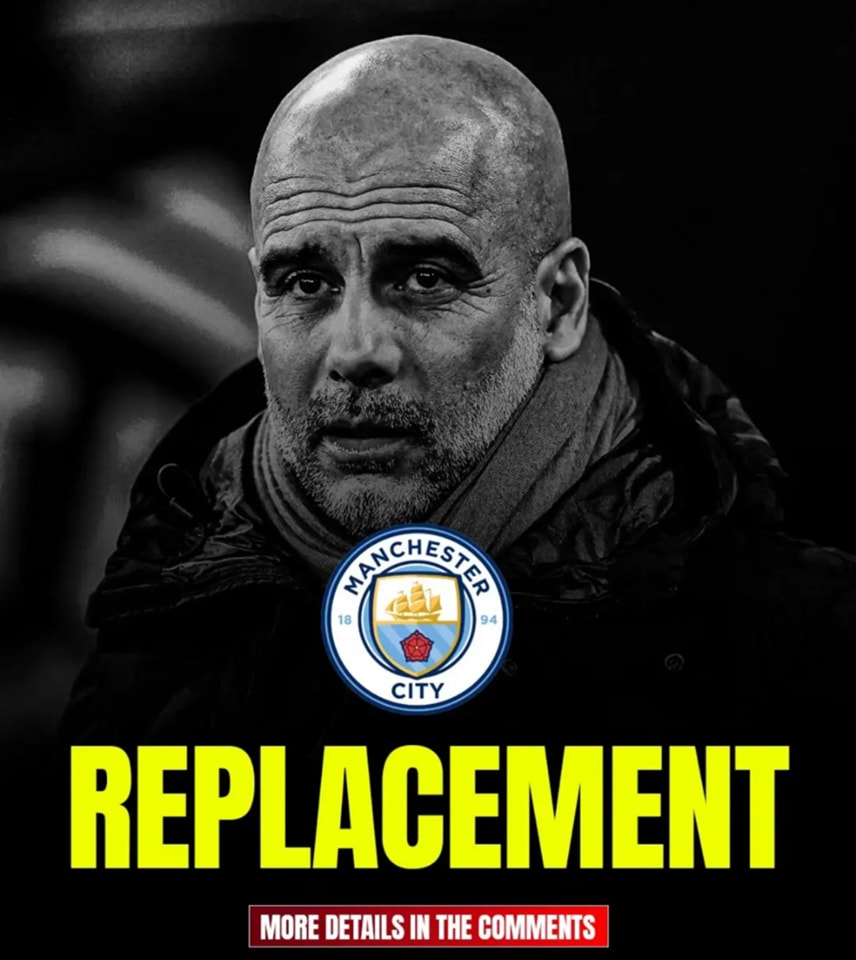
Manchester City finds itself at a crossroads as one of the most successful periods in the club’s history potentially draws to a close. Pep Guardiola, the mastermind behind City’s recent dominance, faces a pivotal decision that could reshape both his legacy and the future trajectory of English football’s most successful team of the past decade.
The 53-year-old Spanish tactician, whose contract expires at the end of the current season, remains uncommitted to extending his stay at the Etihad Stadium. This uncertainty has sent ripples through the football world, with supporters, pundits, and rival clubs all speculating about what comes next for both Guardiola and Manchester City.
Since arriving in Manchester in 2016, Guardiola has transformed City from Premier League contenders into genuine European powerhouses. His tenure has yielded an unprecedented collection of silverware: six Premier League titles, including the historic fourth consecutive championship achieved last season, one Champions League trophy, and a total of 17 major honors. These achievements have firmly established this period as the most successful in Manchester City’s long and storied history.
The architect of Barcelona’s golden era and Bayern Munich’s Bundesliga dominance has brought his revolutionary approach to English football, implementing a style of play that has not only delivered trophies but has fundamentally changed how the game is played in the Premier League. His influence extends far beyond the confines of the Etihad, with countless managers attempting to replicate his possession-based, high-pressing philosophy across all levels of football.
However, recent statements from Guardiola himself have added fuel to the speculation surrounding his future. Following City’s latest Premier League triumph, the manager made the candid admission that he felt “closer to leaving than staying,” a revelation that sent shockwaves through the football community. This honest assessment of his mindset has intensified discussions about potential successors and the direction the club might take should he decide to pursue new challenges.
The Shadow of Uncertainty: Legal Battles and Their Impact
Complicating Guardiola’s decision-making process is the cloud of uncertainty hanging over Manchester City due to the ongoing Premier League charges hearing. The club faces 115 charges relating to alleged financial irregularities spanning a nine-year period from 2009 to 2018. These accusations, which City vehemently denies, encompass a range of alleged violations including failing to provide accurate financial information, breaching profit and sustainability rules, and failing to cooperate with Premier League investigations.
The so-called “Trial of the Century” began in September and is expected to conclude with a verdict in early 2025. The potential consequences of an adverse ruling are severe, with suggestions ranging from substantial fines and points deductions to the extreme possibility of expulsion from the Premier League and other domestic competitions, including the FA Cup and Carabao Cup.
This legal uncertainty has created an additional layer of complexity for Guardiola’s decision. While he is expected to make his choice about his future before the outcome of the charges hearing is confirmed, the potential ramifications of the case cannot be ignored. The prospect of managing a team facing significant sanctions, should the charges be proven, adds an unwelcome dimension to what should be a purely football-focused decision.
The gravity of the situation is further highlighted by the actions of four of City’s biggest rivals. Manchester United, Liverpool, Arsenal, and Tottenham Hotspur have all formally registered possible compensation claims via arbitration, preserving their right to seek damages should City be found guilty. These legal notices, served within the six-year statute of limitations period dating from the initial Football Leaks revelations in November 2018, demonstrate the potential far-reaching consequences of the hearing’s outcome.
The Alonso Factor: A Potential Successor Emerges
As speculation about Guardiola’s replacement intensifies, one name has consistently emerged at the forefront of discussions: Xabi Alonso. The former Liverpool and Real Madrid midfielder has captured the imagination of football fans worldwide with his remarkable transformation of Bayer Leverkusen from Bundesliga also-rans to champions.
Alonso’s achievements at Leverkusen have been nothing short of extraordinary. In his first full season as manager, he guided the club to their first-ever Bundesliga title, completing the campaign without a single defeat – a feat that set a new European record with 51 consecutive games without loss. This unprecedented achievement not only broke Bayern Munich’s stranglehold on German football but also announced Alonso as one of the most promising young managers in world football.
The tactical sophistication displayed by Alonso’s Leverkusen has drawn comparisons to Guardiola’s own methods. Like the City manager, Alonso emphasizes possession-based football, high pressing, and positional flexibility. His ability to develop players and implement complex tactical systems has been particularly impressive, turning previously unheralded talents into key contributors and maximizing the potential of established stars.
However, recent reports from Spanish media have added a new dimension to the Alonso narrative. Eurosport Spain claims that the 42-year-old manager is planning to step down from his role at Leverkusen at the end of the current season, despite the success he has achieved. The report suggests that both Alonso and defender Alejandro Grimaldo are planning departures, with the manager allegedly already informing several players in the dressing room of his intentions.
This development has not gone unnoticed by Manchester City supporters, many of whom have interpreted the timing as more than coincidental. The possibility that Alonso might be making himself available just as Guardiola contemplates his own future has led to widespread speculation about a potential succession plan.
Fan Reactions and Tactical Parallels
The prospect of Alonso taking over from Guardiola has generated significant excitement among City supporters, who see distinct parallels between the two managers’ approaches to the game. Both men prioritize technical excellence, tactical flexibility, and the development of young talent. Their shared emphasis on possession-based football and high-intensity pressing makes Alonso appear to be a natural successor who could maintain continuity in City’s playing style.
Manchester City fans have been quick to connect the dots between the Spanish reports and their club’s managerial situation. Social media platforms have been flooded with speculation, with supporters expressing their belief that Alonso represents the ideal candidate to continue Guardiola’s legacy. The timing of the Leverkusen manager’s potential departure has been interpreted by many as evidence of preliminary discussions or at least mutual interest between the parties involved.
The tactical similarities between Guardiola and Alonso extend beyond surface-level observations. Both managers have demonstrated an ability to adapt their systems based on available personnel while maintaining core philosophical principles. Alonso’s success in transforming Leverkusen’s fortunes mirrors Guardiola’s own track record of elevating teams to new heights through tactical innovation and player development.
Furthermore, Alonso’s playing career provides him with unique insights into elite-level football. His experiences at some of the world’s biggest clubs, including Real Madrid, Liverpool, and Bayern Munich, have given him exposure to different tactical approaches and winning mentalities. This background, combined with his early success as a manager, suggests he possesses the necessary credentials to handle the pressures and expectations that come with managing Manchester City.
Current Season Challenges and Performance Analysis
While the focus on potential managerial changes dominates headlines, Manchester City’s current season performance provides important context for these discussions. The team has faced unexpected challenges, including a shocking 2-1 defeat to Bournemouth that highlighted some concerning defensive vulnerabilities.
The loss at the Vitality Stadium was particularly notable for the struggles of veteran right-back Kyle Walker, whose performance drew sharp criticism from supporters. At 33 years old, Walker appeared to lack his usual pace and defensive awareness, with both Bournemouth goals originating from attacks down his flank. The deterioration in Walker’s form has become emblematic of broader questions about the aging core of Guardiola’s squad and the need for strategic rebuilding.
Fan reactions to Walker’s performance have been particularly harsh, with many concluding that the former England international is no longer capable of performing at the highest level. Comments on social media platforms reflected growing frustration with what supporters see as a decline in standards that has coincided with increased speculation about the team’s future direction.
These on-field struggles have added urgency to discussions about City’s long-term planning. The combination of key players entering the twilight of their careers and uncertainty surrounding the manager’s future creates a complex scenario that requires careful navigation by the club’s hierarchy.
The Xabi Alonso Profile: From Player to Managerial Prodigy
To understand why Xabi Alonso has emerged as the leading candidate to replace Guardiola, it’s essential to examine his journey from world-class midfielder to managerial sensation. Alonso’s playing career was distinguished by exceptional technical ability, tactical intelligence, and leadership qualities that translated seamlessly into management.
During his playing days, Alonso was renowned for his passing ability, vision, and understanding of the game’s tactical nuances. These attributes were evident during successful spells at Real Sociedad, Liverpool, Real Madrid, and Bayern Munich, where he collected numerous honors including Champions League titles, domestic league championships, and international success with Spain.
His transition into management began with coaching roles in Real Sociedad’s youth system before taking charge of Real Sociedad B. This apprenticeship provided him with valuable experience in player development and tactical implementation at a foundational level. When Bayer Leverkusen approached him in October 2022, Alonso was ready to step up to elite-level management.
The transformation he engineered at Leverkusen was remarkable not just for its speed but for its sustainability. The club had been languishing in mid-table mediocrity when Alonso arrived, but his implementation of an attacking, possession-based system quickly yielded results. The historic unbeaten Bundesliga campaign that followed represented one of the greatest single-season achievements in modern football history.
Alonso’s tactical approach shares several key elements with Guardiola’s philosophy. Both managers prioritize building from the back, maintaining possession, and creating numerical advantages in different areas of the pitch. However, Alonso has also demonstrated tactical flexibility, adapting his approach based on opposition and circumstances while maintaining core principles.
Alternative Destinations and Market Dynamics
While Manchester City represents an attractive proposition for Alonso, other potential destinations have emerged in recent speculation. Real Madrid, currently managed by Carlo Ancelotti, has been mentioned as a possible landing spot for the former Blancos midfielder. The Spanish giants have experienced inconsistencies this season, and Alonso’s connection to the club as a former player could make him an appealing candidate for a return to the Santiago Bernabéu.
Real Sociedad, where Alonso began both his playing and coaching careers, represents another emotional possibility. A return to his boyhood club would offer him the opportunity to build something special at a more modest scale while maintaining his connection to the Basque region.
However, the allure of Manchester City remains powerful. The club’s resources, ambition, and established infrastructure provide an ideal platform for a young manager to build upon Guardiola’s foundations. The presence of world-class players, state-of-the-art facilities, and a board committed to success creates an environment where Alonso could potentially achieve even greater heights than those reached at Leverkusen.
The Broader City Football Group Picture
An intriguing subplot in the Guardiola succession discussion involves the possibility of the manager’s next destination. Speculation has emerged linking both Guardiola and key player Kevin De Bruyne to New York City FC, another club within the City Football Group portfolio.
This potential scenario reflects the growing influence of multi-club ownership models in modern football. The City Football Group’s investment in New York City FC includes plans for a new stadium, with construction scheduled to begin soon and completion expected within 30 months. The opportunity to “herald in a new era” at the MLS franchise could appeal to Guardiola, who has previously lived in New York and might welcome a different challenge after nearly a decade in Manchester.
The prospect of Guardiola and De Bruyne moving together to Major League Soccer represents more than just a career transition; it would signal a significant statement about the growing stature and ambition of American football. Their combined presence would undoubtedly raise the profile of MLS and could attract other high-profile figures to the league.
For Manchester City, such a scenario would provide a dignified exit strategy for both their manager and one of their key players while maintaining connections within the broader organizational structure. This approach reflects the sophisticated planning that has characterized City’s operations under the current ownership.
Financial Fair Play and Its Implications
The ongoing charges hearing represents more than just a legal challenge for Manchester City; it embodies the broader tensions within modern football regarding financial regulations and competitive balance. The accusations against City touch on fundamental questions about how clubs can and should operate in the contemporary football landscape.
The potential compensation claims from rival clubs highlight the stakes involved in the hearing’s outcome. Manchester United, Liverpool, Arsenal, and Tottenham’s decision to preserve their legal options demonstrates their belief that City’s alleged violations may have materially affected competitive outcomes and financial opportunities.
Should City face significant sanctions, the implications for player retention and recruitment would be substantial. Star players might seek moves to avoid potential relegation or European competition bans, while the club’s ability to attract top talent could be severely compromised. In such a scenario, even the most attractive managerial position might become significantly less appealing to candidates like Alonso.
Tactical Evolution and Philosophical Continuity
The potential transition from Guardiola to Alonso represents more than just a change of personnel; it could mark the evolution of a tactical philosophy that has defined Manchester City’s recent success. Both managers share fundamental beliefs about how football should be played, but each brings distinct elements to their approach.
Guardiola’s influence on modern football tactics cannot be overstated. His emphasis on positional play, where players occupy specific zones rather than fixed positions, has revolutionized tactical thinking across the sport. The concepts of creating numerical superiorities, manipulating opposition pressing structures, and building attacks through patient possession have become standard elements in contemporary coaching education.
Alonso’s work at Leverkusen suggests he has absorbed these lessons while developing his own interpretations. His team’s ability to maintain possession while also creating direct attacking opportunities demonstrates a sophisticated understanding of when to be patient and when to accelerate play. This balance between control and incision represents an evolution of Guardiola’s principles rather than a departure from them.
The prospect of this tactical continuity has excited City supporters who fear that a more dramatic stylistic change could disrupt the foundations of their recent success. Alonso’s approach would likely preserve the technical excellence and tactical sophistication that have become hallmarks of City’s play while potentially introducing fresh ideas and perspectives.
Player Development and Squad Dynamics
One of Guardiola’s most significant contributions to Manchester City has been his ability to develop players and maximize their potential. Stars like Kevin De Bruyne, Bernardo Silva, and Rúben Dias have reached new heights under his guidance, while younger talents have been carefully integrated into the first team setup.
Alonso’s track record at Leverkusen suggests he possesses similar developmental capabilities. His work with players like Florian Wirtz and Jeremie Frimpong has demonstrated an ability to unlock individual potential while maintaining team coherence. This focus on player development would be crucial for City, given the aging profile of some key squad members and the need for continuous renewal.
The Kyle Walker situation exemplifies the challenges facing any incoming manager. The veteran defender’s recent performances, particularly in the defeat to Bournemouth, have highlighted the physical decline that affects even the most accomplished players. Fan criticism of Walker’s display, where he was repeatedly beaten by Bournemouth’s Antoine Semenyo, reflects broader concerns about squad refresh and regeneration.
Managing this transition period, where established stars must be phased out and replaced, requires delicate handling. Alonso’s experience in building a new team identity at Leverkusen suggests he could navigate these challenges while maintaining competitive standards.
The Competitive Landscape and Rival Perspectives
Manchester City’s potential managerial transition occurs against the backdrop of an increasingly competitive Premier League landscape. Arsenal’s resurgence under Mikel Arteta, Newcastle’s ambitions under Saudi ownership, and the traditional powers of Manchester United and Liverpool all present significant challenges for whoever takes charge at the Etihad.
The compensation claims filed by rival clubs reveal the extent to which City’s success has been viewed with suspicion by their competitors. The legal maneuvering suggests that these clubs believe they have been materially disadvantaged by City’s alleged rule violations, adding another layer of complexity to the succession planning process.
From a competitive standpoint, the potential appointment of Alonso could be seen as City’s attempt to maintain their edge over these rivals. His proven ability to outthink and outmaneuver experienced coaches in the Bundesliga suggests he could continue City’s dominance in English football, regardless of external pressures.
Historical Context and Managerial Succession
The challenge of replacing a successful manager is one of football’s most complex problems. History is littered with examples of clubs struggling to maintain standards after legendary figures depart. Manchester United’s difficulties following Sir Alex Ferguson’s retirement and Arsenal’s initial struggles after Arsène Wenger’s departure serve as cautionary tales for City’s board.
However, the circumstances surrounding Guardiola’s potential departure differ significantly from these historical examples. Unlike Ferguson and Wenger, who left after extended periods of decline, Guardiola would be departing at the peak of his success. This timing could actually facilitate a smoother transition, as any successor would inherit a squad still operating at the highest level.
The identification of Alonso as the preferred candidate also suggests a level of strategic planning that was absent in some previous high-profile managerial transitions. Rather than scrambling to find a replacement after an unexpected departure, City appears to be conducting a methodical succession planning process that considers both immediate needs and long-term objectives.
International Implications and Market Impact
The potential managerial change at Manchester City would have implications extending far beyond English football. Guardiola’s next destination, whether it be New York City FC or another challenge entirely, would significantly impact the global football landscape. His presence in Major League Soccer, for instance, would represent a major coup for American football and could accelerate the league’s development.
Similarly, Alonso’s move from the Bundesliga to the Premier League would continue the trend of successful managers testing themselves in different leagues. His success in Germany has already established him as one of Europe’s most promising young coaches, and a successful tenure at City would elevate his status even further.
The international transfer market could also be affected by these potential changes. Guardiola’s departure might prompt some City players to consider their own futures, while Alonso’s appointment could attract different types of talent to the club. The Spanish manager’s connections in La Liga and his reputation for developing young players could open new recruitment avenues for City.
Financial Considerations and Squad Planning
The financial implications of a managerial transition extend beyond the obvious costs of compensation and new appointments. Different managers often prefer different types of players, and a change in tactical approach could necessitate significant squad adjustments.
City’s current squad has been specifically assembled to suit Guardiola’s tactical preferences. The technical quality, positional intelligence, and physical attributes of the players reflect careful selection based on the manager’s requirements. Any successor would need to work with this existing foundation while potentially identifying areas for modification.
Alonso’s success at Leverkusen was built on maximizing the potential of available resources rather than relying on massive transfer spending. This approach could be particularly valuable for City, given the potential financial constraints that might result from the charges hearing outcome. His ability to develop players and create effective tactical systems without unlimited resources demonstrates the kind of adaptability that could serve City well in various scenarios.
The Kevin De Bruyne Connection
The speculation linking Kevin De Bruyne to a potential move to New York City FC alongside Guardiola adds another fascinating element to this developing story. The Belgian midfielder, widely regarded as one of the finest players of his generation, has been instrumental in City’s success under Guardiola.
De Bruyne’s contract situation mirrors that of his manager, with both deals expiring in 2025. The prospect of the pair continuing their partnership in a new environment speaks to the strong working relationship they have developed over the years. For De Bruyne, who has faced injury challenges in recent seasons, a move to MLS could provide an opportunity to extend his career while taking on new challenges.
The potential departure of both Guardiola and De Bruyne would represent a seismic shift for Manchester City. These two figures have been central to the club’s identity and success in recent years, and their simultaneous exit would create significant voids that any new manager would need to address.
Looking Forward: The Decision Timeline
As the football world awaits clarity on these interconnected situations, several key factors will influence the eventual outcomes. Guardiola’s decision about his future at City will likely serve as the catalyst for a series of subsequent moves involving Alonso, De Bruyne, and potentially other key figures.
The manager has indicated that he will make his decision during the current season, providing some certainty about the timeline involved. This approach allows for proper succession planning while avoiding the destabilizing effects of prolonged uncertainty.
For Alonso, the current season at Leverkusen presents both an opportunity and a challenge. While his team has struggled to match last season’s unprecedented heights, finishing fourth in the Bundesliga would still represent a successful campaign by most standards. His handling of this transitional period could influence City’s assessment of his readiness for such a significant step up.
Conclusion: A Pivotal Moment in Football History
The convergence of these various factors creates one of the most compelling storylines in modern football. The potential end of Guardiola’s Manchester City tenure, combined with Alonso’s emergence as a managerial talent and the ongoing legal uncertainties surrounding the club, represents a pivotal moment that could reshape the landscape of elite football.
Regardless of the eventual outcomes, this period will be remembered as a defining moment for Manchester City. The decisions made in the coming months will determine whether the club can maintain its position at the pinnacle of world football or faces a period of rebuilding and adaptation.
For Guardiola, the choice represents a chance to cement his legacy at City or pursue new challenges that could further enhance his reputation as one of football’s greatest managers. For Alonso, any potential move to Manchester would represent the ultimate test of his managerial credentials and an opportunity to establish himself among the elite coaches of his generation.
The football world watches with anticipation as these interconnected narratives unfold, knowing that the resolutions will have lasting implications for clubs, players, and the sport itself. In an era where managerial appointments can make or break institutional ambitions, the stakes have never been higher for all parties involved.
As Manchester City navigates this period of uncertainty, the club’s ability to handle the transition period with grace and strategic thinking will ultimately determine whether this represents the end of one golden era or the beginning of another. The beautiful game awaits these crucial decisions with bated breath.
